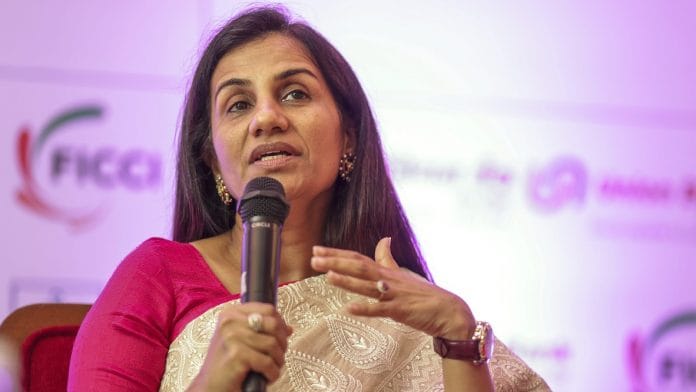The ICICI Bank’s directors who helped cultivate former CEO Chanda Kochhar’s image of invincibility failed in their duty to uphold governance.
India’s ICICI Bank Ltd. is seeking to claw back bonuses and stock options paid to departed Chief Executive Officer Chanda Kochhar. That gives shareholders of the nation’s second-biggest private sector lender some justice. But the board should be made to hang its head in shame.
Allegations of conflict of interest against the CEO first arose in October 2016. At the heart of the scandal was a 32.5 billion rupee ($456 million) loan to Videocon Group. Kochhar’s husband had beneficial business dealings with Videocon Managing Director Venugopal Dhoot, yet the CEO didn’t recuse herself from the credit committee that sanctioned the loan in 2012.
For more than a year, the board of directors sat on a whistleblower’s complaint. Worse still, when the media started asking questions, Chairman Mahendra Kumar Sharma gave Kochhar a hasty vote of confidence in March last year. Finally, when it became clear to everyone except the board that her continuing at the bank was a problem, it ordered an inquiry by a retired judge. Even then, Kochhar agreed only to go on leave. Shortly afterwards, Sharma finished his term and was gone.
It’s only now that the inquiry has found Kochhar violated the bank’s code of conduct that ICICI has decided to treat her October resignation – tendered while she was on leave – as a termination. Kochhar says she is “utterly disappointed, hurt and shocked” by the decision.
She’s right to be shocked. Which Indian board willingly reopens a book after making every effort to close it? Even now, the new directors would have liked to forget the whole thing and move on. That’s impossible, now that the government’s investigative agency has charged Kochhar, her husband and Videocon’s Dhoot with criminal conspiracy and cheating. The Central Bureau of Investigation’s first information report also names Kochhar’s predecessor and successor among people who could be investigated in the future.
Suddenly it has become important for ICICI to draw a line between Kochhar and the bank; this time last year, she was the bank. The directors who helped her cultivate that image of invincibility abdicated their duty to uphold governance. Leave aside the Videocon loan, and the “illegal gratification and undue benefit” Indian sleuths allege she received via her husband. Ask instead why the board was giving her a performance bonus that it now wants to take back. For piling up bad loans?
ICICI directors shouldn’t get a free pass from regulators. Otherwise, they’ll just show up at other boards, perpetuating a culture of CEO worship that’s at odds with their role as stewards of public shareholders. Indian investors deserve better.-Bloomberg







‘Andher nagari, chaupat raja, taka ser bhaji, taka ser khajha’ (darkened city, stupid King, paisa-a-kilo vegetable, paisa-a-kilo the sweet) by famous Hindi poet Bhartendu Harishchandra reigns valid when it comes to accountability in governance. However, we Government walahs were made to believe that the corporate world is smarter for its money and reputation. Alas, no, we all are the same !!
1. Ms Chanda Kochar’s case underscores the fact that often the sub-committees of Board of Director of a listed public limited company may be ineffective in dealing with irregularities. 2. Independent Directors on Board of a listed public limited company have to be really independent. Question is this: are they really independent? Another question related to investigations in Ms Chanda Kochar’s case is this: Would the investigations be really free?
The BoD have highest accountability as far as the company’s functioning is concerned. They can be tried for criminal negligence and abdicating duty and comprising the sharehders’ interests and the interest of the thousands of depositors. Chanda has no excuse anyway, the action is from the Bank with regard to terminating her. Its fo rhe prosecuting agencies to round up more actors into this crime, as this could not have been possibility without the Board’s connivance or silence
When the lady reigned, no one knew who the Directors – or even her senior colleagues – were. As for oversight over the CEO by the Board, if one large transaction of this nature took place around the time of her elevation, the question arises whether it was a one off, possibly because the families were known to each other, or whether it was a pattern of misconduct.